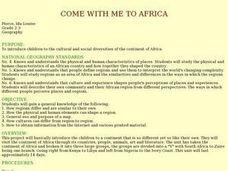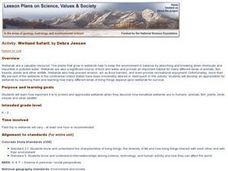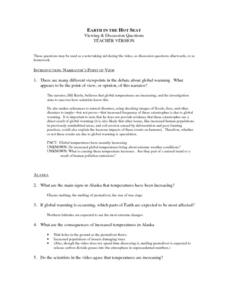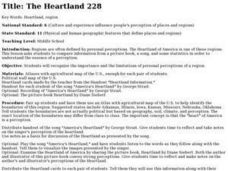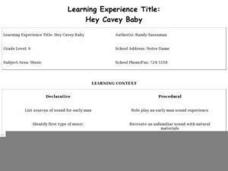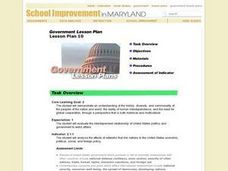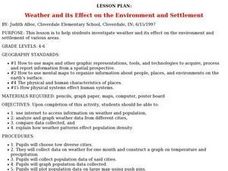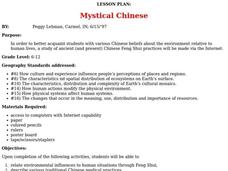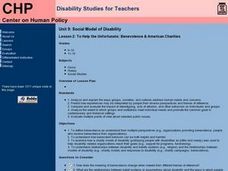Curated OER
Come With Me To Africa
Students are introduced to the geography of the continent of Africa. They conduct Internet research, explore maps and identify animal species and a variety of human cultures for a sampling of African countries. Students create graphs,...
Curated OER
The Fungus Among Us
High schoolers explore the basic characteristics and roles of fungi. They discuss the importance of fungi to humans. Students investigate the relationship between cell structure and function and explore the diversity and variation of...
Curated OER
Biodiversity Bird Hunt
Students examine the influence of biodiversity on human culture through the use of birds. They brainstorm words that come to mind when they think of human cultures. They describe ways that human culture and biodiversity are linked.
Curated OER
I Depend on You, You Depend on Me!
High schoolers explore the interdependency between humans and the ecosystems. They examine how uncontrolled development threatens the rain forests. They discuss how human actions affect the rain forest.
Curated OER
The Science of Psychology
Students explain the differences between psychology, pseudoscience and popular opinion. In groups, they describe, compare and contrast the various biological and cognitive perspectives in the field. Using the internet, they describe the...
Curated OER
Looking Through Lenses
Students explore the various societal and cultural "lenses" which color their perspectives and life experiences by reading the short story "What Means Switch" by Gish Jen. They discuss how the cultural ideas and beliefs affect the...
Curated OER
Who Lives In The Water
Pupils investigate the environment of a stream or lake to collect and observe macroinvertebrates in their natural environment. They record data and summarize the information obtained. Students look to see if there has been any human...
Curated OER
Mental Mapping Hangman
Students participate in mental mapping hangman activity. They choose the name of a country from a hat, draw that country on the board including at least one physical feature produced by nature or humans while not using any speech while...
Curated OER
Wetland Safari!
Students identify how humans, fish, plants, birds, insects and other wildlife benefit from wetland environments. They observe a wetland and its inhabitants, draw a migration map that represents how birds use wetlands in traveling long...
Curated OER
Earth in the Hot Seat
Students identify the different viewpoints on the issue of global warming. While watching a video, they take notes on the issues presented to them and answer questions about what Alaska, Peru and East Africa are doing to prevent global...
Curated OER
The Revolving Door: U.S. Immigration
Learners compare current cultural perceptions of the immigrant experience with ones of the past. They will relate current immigration stories as seen in the PBS documentary "The New Americans" to those of the historical past.
Curated OER
The Heartland
Students note how personal perceptions influence the understanding of what a region. They look at an agricultural map of what is considered to be the Heartland of the US. They read the words to George Strait's, America's Heartland to see...
Curated OER
Overpopulation vs. Overuse of Resources
Tenth graders identify the consequences of human population growth. For this biology lesson, 10th graders debate on whether overpopulation or overuse of resources is more harmful to humans. They write a reflection at the end of the...
Curated OER
Cracking the Genetic Code
High schoolers explain what the knowledge of DNA can tell us about ourselves and other organisms and species. They also explore the systematic study of the human genome.
Curated OER
An Activity to Introduce the Geoscience Perspective
Students examine various rock specimens assuming the viewpoints of various individuals--sculptor, landowner, preacher, etc. They study the rock, and then prepare a list of observations and questions. They summarize and share their...
Curated OER
Nazism
Tenth graders explore the acts of the Nazi party and discuss how people can commit atrocities against humanity. They discuss the aspects of the Aryan race that the Nazis identified with and how they led them to think they should purify...
Curated OER
Hey Cavey Baby
Ninth graders create an unfamiliar sound with natural materials. They role play an early man sound experience. They imagine themselves a member of a clan of early people.
Curated OER
Government Lesson Plan: Lesson Plan 10
High schoolers explore the history, diversity, and commonality of the peoples of the nation and world. They analyze how the United States' political, economic and social goals directly affect our foreign policy.
Curated OER
Fast Forward
Students view a television program exploring social and economic changes at the close of the twentieth century. They discuss changes from differing perspectives including poor and rich citizens from various countries. Students write an...
Curated OER
Weather and its Effect on the Environment and Settlement
Students, after choosing two diverse cities, collect data on weather for a month and construct a graph on temperature and precipitation. After collecting population data of said cities, and graphing it, they plot population on a large...
Curated OER
Yearly Place Based theme
Students are awaken to their surroundings. They gain a greater access of how their city was formed. Students assess the human impact on the land. They comprehend the cultural diversity of the city.
Curated OER
Mystical Chinese
Students relate environmental influences to human situations through Feng Shui, describe various traditional Chinese medical practices, and explore the use of natural forces in Chinese medicine.
Curated OER
Mystical Chinese
Students explore various Chinese beliefs about the environment. Using the internet, they research the characteristics of Feng Shui. They discuss how human actions modify the physical environment and vice versa. They discover how the...
Curated OER
Bevevolence & American Charities
High schoolers examine benevolent behavior from different perspectives. They discover that it can be both helpful and harmful. They examine the relationship between the disabled and different belief systems.
